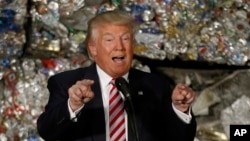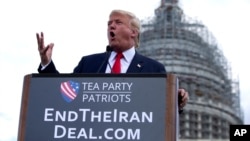Contrary to a common criticism, President-elect Donald Trump has held strikingly consistent positions on foreign policy since he emerged as a politically ambitious real estate tycoon in the 1980s.
In 1987, Trump, then 41, took out full-page advertisements in national newspapers in which he criticized America's defense policy and said the U.S. "should stop paying to defend countries that can afford to defend themselves."
The ad bore a message "remarkably similar to what he's saying today," said Thomas Wright of the Brookings Institution, a Washington policy research group.
Wright, a scholar of strategy and international order, has combed through dozens of Trump interviews, speeches, statements and newspaper advertisements to try to make sense of the president-elect's worldview. What he uncovered was that Trump developed a keen interest in world affairs in the 1980s and has not changed his views since.
Core beliefs
Wright's research identified three core beliefs that he said Trump has consistently held for the better part of the last three decades and is unlikely to change much when he enters the White House in January.
First, Trump is highly critical of America's international alliances and wants to abandon them. Second, Trump is opposed to trade agreements with other countries and "wants to use tariffs and punitive measures to remake the international economic order." And finally, Trump has a "soft spot" for authoritarian regimes, particularly Russia.
"While there were many issues he has no views on and many issues he takes multiple views on, there are a few in which he's been completely consistent over time dating back three decades," Wright said.
How Trump came to embrace these views remains something of a puzzle, although Wright theorizes that it may have had something to do with the economic rise of Japan and Japanese investments in New York real estate in the 1980s.
Isolationist doctrine
Taken together, these beliefs came to define what Wright described as Trump's isolationist foreign policy doctrine. Well into the final days of the campaign, Trump seized every opportunity, often unprompted, to drive home his three favorite foreign policy themes. He hammered NATO members as free riders; he accused China of "ripping this country" and vowed to cut more favorable trade deals; and he praised Russian President Vladimir Putin as a strong leader with whom he could do business.
"I think Russia is an interesting test case here," Wright said. "It was in his political interest to criticize Putin, to criticize Russia, but he never did. And despite the pushback, he always said nice things about Putin and Russia. And that shows how much he believes in it."
Prior to Trump's stunning victory in Tuesday's presidential election, many experts had dismissed his tough talk on China and NATO as populist bluster. Now, they're wondering whether Trump will moderate his views or remain uncompromised by the constraints of office once he enters the White House.
"As a candidate you make certain kinds of declarations, and then when you become president, you become aware of the cost of carrying through on those promises," said Michael Barnett, a professor of political science at George Washington University.
"I can imagine when he'll come in and say, 'We'll renegotiate this Iran deal.' I can imagine advisers and especially allies saying, 'No, you're not.' "
Relationships at risk
The stakes are high. From NATO and America's security alliances with Japan and South Korea to the World Trade Organization and the Paris climate agreement, a host of partnerships and accords underpinning the postwar international order are at risk of unraveling.
"Security alliances are based on some degree of trust and some degree of guarantees and predictability," Barnett said. If allies lose confidence in America's commitment to their security, "you're going to see a whole bunch of our allies begin to reconsider their alliance relationships."
For his part, Trump struck a conciliatory note in his victory speech early Wednesday morning.
"We will seek common ground, not hostility; relationships, not conflict," he said.
A test of the approach he takes to foreign policy will come in the coming weeks when the president-elect names members of his cabinet. Trump has said he'll hire "talented experts" to help him navigate the complexities of national security and foreign policy.
Meanwhile, Barnett said, Trump's victory "is adding a high degree of uncertainty" around the globe.


